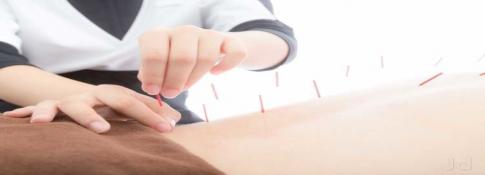Acupuncture

Acupuncture is a treatment derived from ancient Chinese medicine. ..
Acupuncture
Acupuncture is a treatment derived from ancient Chinese medicine. Fine needles are inserted at certain sites in the body for therapeutic or preventative purposes.
It is used in many NHS general practices, as well as the majority of pain clinics and hospices in the UK.
Acupuncture is often seen as a form of complementary or alternative medicine (CAM).
How acupuncture works
Western medical acupuncture is the use of acupuncture following a medical diagnosis. It involves stimulating sensory nerves under the skin and in the muscles of the body.
This results in the body producing natural substances, such as pain-relieving endorphins. It's likely that these naturally released substances are responsible for the beneficial effects experienced with acupuncture.
A course of acupuncture usually creates longer lasting pain relief than when a single treatment is used.
Traditional acupuncture is based on the belief that an energy, or "life force", flows through the body in channels called meridians. This life force is known as Qi (pronounced "chee").
Practitioners who adhere to traditional beliefs about acupuncture believe that when Qi doesn't flow freely through the body, this can cause illness. They also believe acupuncture can restore the flow of Qi, and so restore health.
Uses of acupuncture
Acupuncture practitioners – sometimes called acupuncturists – use acupuncture to treat a wide range of health conditions. However, the use of acupuncture isn't always based on rigorous scientific evidence.
The National Institute for Health and Care Excellence (NICE) provides guidelines for the NHS on the use of treatments and care of patients.
Currently, NICE only recommends considering acupuncture as a treatment option for:
chronic tension-type headaches
migraines
Acupuncture is also often used to treat other musculoskeletal conditions (of the bones and muscles) and pain conditions, including:
chronic pain, such as neck pain
joint pain
dental pain
postoperative pain
However, in many conditions where acupuncture is used, there's less good quality evidence to draw any clear conclusions over its effectiveness compared with other treatments.
* * *
Can acupuncture be a painkiller?
Dr Saleyha Ahsan investigates whether acupuncture can help with pain relief.
Medical acupuncture (based on the traditional Chinese medical practice) is becoming increasingly popular and is available on the NHS for some kinds of pain relief, including for chronic tension-type headaches and migraines. But what’s the evidence that it’s effective?
Saleyha visits the University of York’s Neuroimaging Centre, where she receives acupuncture while lying inside an fMRI scanner. The scanner measures what is going on inside her brain whilst acupuncture needles are inserted into her hand by Prof Hugh Macpherson, who has been carrying out this procedure on volunteers as part of a trial.
Saleyha’s brain scan, like those of Prof MacPherson’s other subjects, shows a deactivation (measured by a decrease in blood flow) in the limbic system inside the brain. The limbic system, known as the pain matrix, is the part of the brain believed to be responsible for the perception of pain.
Instead of stimulating the perception of pain, as you may expect, having needles stuck in her hand has appeared to reduce the activity of the pain matrix. It’s evidence of an effect that might explain how acupuncture could work as a painkiller, although it’s not evidence as to why it can cause this decrease in the pain matrix.
It’s possible that the needles may stimulate the nervous system to release neurotransmitters involved in pain-suppressing mechanisms – but it’s also possible that the changes in the brain are due to the placebo effect where the mere expectation that something will relieve pain results in a reduction in pain.
In fact, a review of the scientific evidence recently found that acupuncture was no better than a placebo in treating those living with low back pain and sciatica and the latest draft guidelines from the National Institute for Health and Care Excellence (NICE) no longer recommend acupuncture as a treatment for this kind of pain.
So while it does seem that acupuncture can have an effect on pain it’s likely to remain a subject for debate until we have more evidence of effectiveness beyond the placebo effect.




 del.icio.us
del.icio.us Digg
Digg

Post your comment